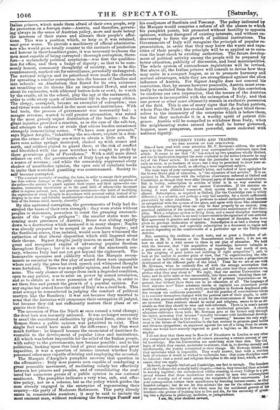UNIVERSITY TESTS AND TRAINING.
TO THE EDITOR OF THE SPECTATOR.
Sut—I have read with some attention Mr. F. Newman's address, the article upon it in the Times newspaper, and your correspondent's strictures upon that article. It seems to me that "F." has mixed up two questions wholly distinct, and has by implication imputed the same confusion to the writer (whoever he may be) of the Times' article. To show that the journalist is not chargeable with such an error, is no business of mine; but I maye permitted to draw your at- tention to the confusion itself , as affecting a most important subject The main topic of your correspondent's letter, and indeed of most apologies for the Gower Street plan of education, is "the signature of test articles." It is as- sociated by Mr. Newman with the religious observances enforced at Oxford and Cambridge, as though they were alike integral parts of those academical systems. But in reality, subscription to articles of belief is in no way essential to the theory or the practice of our ancient Universities. If the statutes en- forcing it were abolished tomorrow' their system would in no respect be altered. Subscription, as required at Oxford, (for the Cambridge rule is widely different) is a security, and perhaps a very bad security, for a result sufficiently guaranteed by other conditions. It professes to admit exclusively such learn= as sympathize with the system of the place, and agree with those who administer its discipline; attempting what can only be done properly by an earnest, Uzi% practical exhibition of the system, and a conscientious maintenance of the disci- pline. With a religious system in living force, and a moral discipline exercising legitimate influence, there is no need to have resort to the signature of test-articles. Real agreement in practice and conduct may be required of disciples, who have given no previous declaration of opinion. Subseelption is at best a clumsy way of insuring conformity, and especially subscriptioa to a document so vague and so much depending on the controversies of a particular age as the Thirty-nine Articles.
But, assuming the abolition of such tests, and as great a freedom of ad- mission as Mr. F. Newman or the Nonconformist could desire, I do not sae how we shall be a whit nearer to them in our plan of education. We hold with the lecturer, that "the acquisition of knowledge, however valuable be a profession or art, is quite secondary, as regards the real worth of man, to the adopting of good habits and imbibing of right sympathies"; and, to look at the matter in another point of view, that "in superintending the edu- cation of an individual, we may reasonably be anxious to secure a proportionate development of the different parts of the mind." Thus far we are at one with Mr. Newman, when he suddenly flies off with the strange assumption that "public systems of instruction cannot, and will not, enter into these minute cares, profess what they may about it." We reply, that our ancient Universities can enter, and do enter more or less successfully, into these cares; thinking them nei ther minute, impossible, nor unnecessary, but of primary importance—so un portant, that without them there can be no education at alL The language of their statutes is—" Tutor scholares totalw et regimini mo cornmissos .probis moribus imbuat, . ac pro virili sun discipline) in Ecelesid Anglicaua pub. lice receptor, eos conformes prmstabit." And the practice of conscientious tutors is to consider themselves charged with the pastoral care of their pupils, in addi- tion to that parental authority with which by the circumstances of the case they are invested- That students should be moral and religions, seems to be as de- sirable as that they should be wise and well-informed. There is in man's nature a religious principle as certainly as there is an intellectual principle. A church education cultivates them both: Mr. Newman gets at the former only through the latter, assuming that because "morality increases with intellectual develop- ment," it increases may in that way. I say assuming," because his only argu- ment is the failure of the Universities in the last century to promote good habits and virtuous sympathies; an argument against the use of a thing from its abase, which one would have scarcely expected so good a logician as Mr. Newman to employ. I do not deny that there may be Boards of Examiners in London or any other city competent to grant degrees to all comers possessing a certain amount of use- ful knowledge. But the Universities are something more than this. The Gal leges, of which they consist, undertake to educate that is, to develop morally and intellectually, the youths committed to their charge. Mr. Newman thinks that they undertake what is impossible. They would answer, that with a resideet body of scholars it would be wicked to undertake less; that some discipline must be enforced; that a moral and religious discipline is the only kind, which, as edu- cators, they can apply.
However, as regards Oxford and Cambridge, one fact is enough. The founders of all the &lieges did actually build chapels,—that is, they intended their scholars to worship together; the ecelesiaqical edifice standing in every College is a per- petual witness that those institutions were reared by men who contemplated unity of worship and of creed among the recipients of their endowments. Let your correspondent imitate their munificence by founding lecture-rooms, as they founded colleges; but do not let him mistake the one for the other--education for examination, the culture of the whole man for the accidental growth of his intellect—the process of training him to live and die, for the ceremony of greet- ing him a diploma in philology, medicine or jurisprudence.
I am, Sir, your obedient soma, M. '


























 Previous page
Previous page